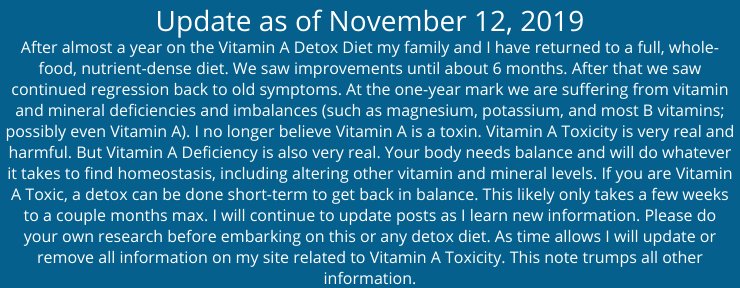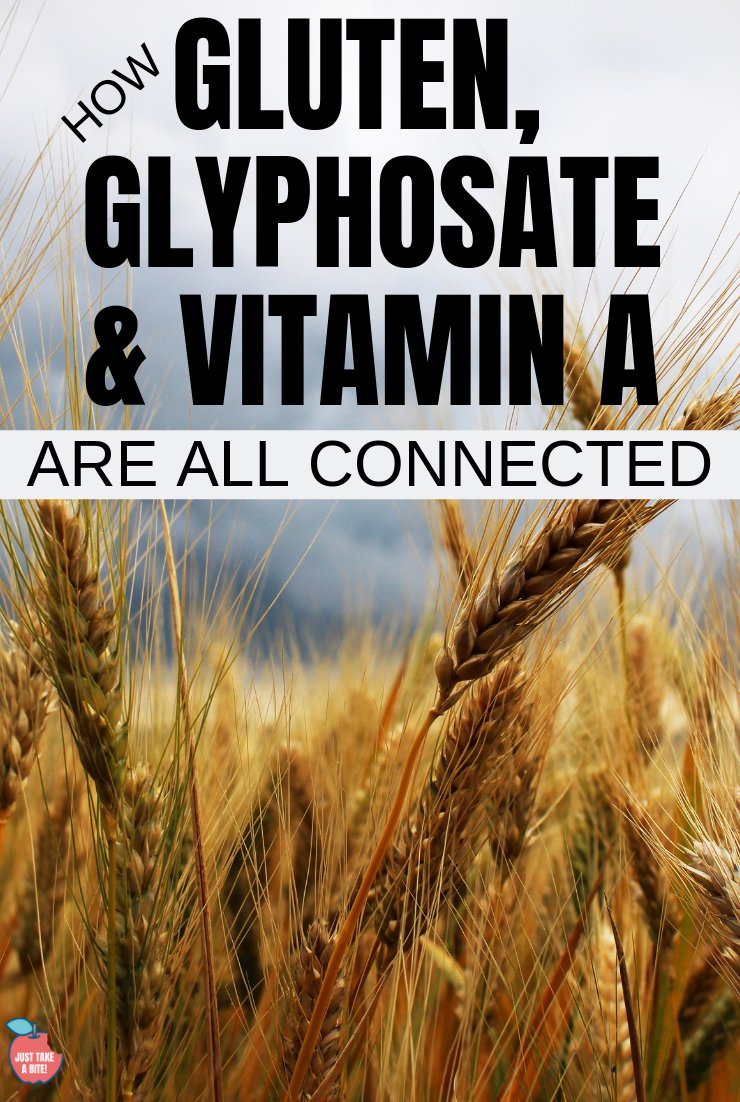
I have good news for my gluten free readers…you probably are not actually gluten intolerant! Even if you have celiac disease there is hope. Is gluten really the problem? Nope! Glyphosate impacts Vitamin A Toxicity significantly, causing the gluten-related problems.

NOTE: I no longer support the Vitamin A as poison theory. All information in this article is purely to help you understand what it is based on. It is possible to get too much Vitamin A by overdosing supplements or liver. But that doesn’t happen often and can be quickly remedied if it does. Vitamin A from animal sources is an essential part of the diet. Beta Carotene can cause carotenemia (as my son had) but will not overload the body with Vitamin A. I encourage you to research and make your own decisions. You can read our update/why we turned and ran from the Vitamin A Detox Diet HERE.
What if I told you gluten was not a problem…for anyone? Would you think I’m crazy? Probably.
Gluten is somewhat of an evil word these days. It gets blamed for just about every health problem and disease.
There are lots of scientific studies that link gluten to specific conditions and to the health of the gut. Some say that all grains are evil and that it’s more than just the gluten.
I don’t believe them.
I know. A bold statement. Remember, it’s coming from someone that has been on a gluten free diet for six years. All of my kids are gluten free as well. I even wrote a whole post about why we are eating gluten-free. So I’ve been on the gluten free bandwagon for a long time. And I’m not jumping off just yet.
But that could change. I’m hoping to get back to making traditional sourdough bread (with gluten-containing grains) soon. For my whole family.
Turns out the scientists could be looking at the wrong details.
Whether mistakenly or on purpose I’m not sure.
When they study the impact of gluten on the gut and autoimmune disease they see a correlation. And for good reason. But it’s not the gluten itself.
So what is the problem?
Glyphosate. And Vitamin A.
What is Glyphosate?
According to the EPA: “Glyphosate is a widely used herbicide that controls broadleaf weeds and grasses.”
It has been used as a pesticide since the 1970’s in products such as Roundup®. It is sprayed on many crops such as fruits, vegetables and almost all non-organic grains.
Although the EPA claims that it “has a low toxicity for humans,” recent events have proven otherwise. In August, 2018 a school groundskeeper was awarded $289 million in a court case against Monsanto (the maker of Roundup®) because the herbicide caused him terminal cancer. [source]
He’s not the only one. There are actually thousands of people suing Monsanto, claiming the herbicide gave them cancer.
In March of 2015 the WHO declared glyphosate as “probably carcinogenic to humans.” [source] The EWG agreed with this claim.
Glyphosate is classified as likely carcinogenic (and many would argue that it most certainly is). And yet it is sprayed on a large portion of the world’s food supply. Anybody else see a problem with that?
How Glyphosate and Gluten are Related
A lot of commercially grown wheat is currently sprayed with glyphosate just before harvest. The glyphosate does not help in growing the wheat. It simply speeds the drying process before harvest, desiccation. A toxin is sprayed on your food to get it to the supermarket a few days sooner. Sounds like a good idea, right?
Glyphosate is also widely used on oats. Although oats are gluten free, many people with some type of gluten intolerance have trouble with oats. Many have speculated cross-contamination from wheat since they are often grown in nearby fields. But it could actually be the glyphosate.
I want to briefly add in here that the use of glyphosate generally implies a food is genetically modified (learn more about GMOs here). The modification is made so the plant can tolerate the glyphosate. So the two go hand-in-hand. They are NOT the same thing. But they often go together. I am not a supporter of genetically modified crops either. I don’t think God intended for us to mix DNA between plants and even between species.
Glyphosate and Celiac
Here is an entire interview with Dr. Stephanie Seneff about the relationship between glyphosate and celiac disease. And here is some great information from the interview:
The use of glyphosate on wheat crops has risen in tandem with the rise in Celiac disease. In fact, it correlates to a greater degree than glyphosate usage on corn and soy. According to Dr. Seneff, desiccating non-organic wheat crops with glyphosate just before harvest came in vogue about 15 years ago. Interestingly enough, when you expose wheat to a toxic chemical like glyphosate, it actually releases more seeds. “It ‘goes to seed’ as it dies,” Dr. Seneff explains. “At its last gasp, it releases the seed.”This results in slightly greater yield, and the glyphosate also kills rye grass, a major weed problem for wheat growers that is resistant to many other herbicides. What they’re not taking into consideration is the fact that rye grass helps rebalance the soil, and from that perspective is a beneficial plant.So, most of the non-organic wheat supply is now contaminated with glyphosate. A large percentage of processed foods are made from wheat, and this helps explain the explosion of Celiac Disease and other gut dysfunction.What happens is that the villi in your gut get destroyed by the glyphosate, which reduces your ability to absorb vitamins and minerals. Also, wheat contains gliadin, which is difficult to break down. Normally, a reaction takes place that builds connections between different proteins in the wheat.But glyphosate gets right in the middle of that process too, resulting in wheat that is highly indigestible. Dr. Seneff and her co-researcher Dr. Anthony Samsel believe the glyphosate may attach to the gliadin as a consequence of a chemical reaction. The end result is that your body develops an immune reaction.
According to this study, “Fish exposed to glyphosate develop digestive problems that are reminiscent of celiac disease. Celiac disease is associated with imbalances in gut bacteria that can be fully explained by the known effects of glyphosate on gut bacteria. Characteristics of celiac disease point to impairment in many cytochrome P450 enzymes, which are involved with detoxifying environmental toxins, activating vitamin D3, catabolizing vitamin A, and maintaining bile acid production and sulfate supplies to the gut. Glyphosate is known to inhibit cytochrome P450 enzymes. Deficiencies in iron, cobalt, molybdenum, copper and other rare metals associated with celiac disease can be attributed to glyphosate’s strong ability to chelate these elements. Deficiencies in tryptophan, tyrosine, methionine and selenomethionine associated with celiac disease match glyphosate’s known depletion of these amino acids.”
How Glyphosate Impacts Vitamin A Toxicity
So what does this have to do with hypervitaminosis A? I want you to really listen here. Because this is one of the biggest factors in your health problems and your ability to detox Vitamin A.
Glyphosate slows/stops the natural breakdown of Poison/”Vitamin A.
Let’s put the puzzle pieces together here. Glyphosate is on wheat. Glyphosate stops your body from detoxing Vitamin A. Eating wheat causes worse Vitamin A toxicity and then prevents your body from getting rid of Vitamin A.
So eating wheat is actually giving you symptoms of Vitamin A Toxicity. What appears to be a reaction to gluten is actually poisoning from Vitamin A.
The fun doesn’t stop there. “Glyphosate chelates…minerals. It forms a cage around them, such that the bacteria can’t get at them even, so the gut bacteria become deficient, and then they die because they can’t get these critical nutrients. Because glyphosate is caged.” [source]
Glyphosate also impacts methylation. This topic has been popular in the natural health world in the last few years. Knowing if you are an over or under methylator can tell you a lot about your health. It also closely related to genetic expression. But your health problems are not the fault of your genes. Glyphosate actually can increase and decrease methylation in different areas of the body in different people.
Some say glyphosate is the main culprit in our autism epidemic. Since glyphosate is so prevalent in our food and water supply and it is even in vaccines, this is very plausible. Which would mean that detoxing from glyphosate could reverse autism. This could also be why a gluten free diet seems to help many kids both on the spectrum and with other neurological disorders like ADD/AHDH. You can read more about the glyphosate-autism connection here.
Sadly glyphosate and it’s relation to Vitamin A toxicity is even linked to birth defects. I’ll dig deeper into this issue in a future post.

Is There A Solution?
It’s pretty obvious that the prevalence of glyphosate in our food supply and our environment is a problem. So is there a solution? Yes and no.
One way to try to avoid glyphosate is by buying organic wheat (and all other grains). Unfortunately glyphosate has been so widely used that it is now unavoidable. The wind carries it from the wheat fields to other fields (even organic ones). Glyphosate is in our water supply. Even rain water now tests positive for glyphosate. So it rains glyphosate on organic crops. You really can’t get completely away from it.
As a probable carcinogen, even small amounts in your food can have a big impact on your health. And we all get at least small amounts.
Some people that are gluten intolerant switch to einkorn, an ancient variety of wheat. While this may help remove the glyphosate factor, it is not a great solution. Einkorn actually is higher in Vitamin A than other varieties of wheat. Most grains do not have any Vitamin A. So if you are already toxic, einkorn will just compound the problem. If you are not dealing with hypervitaminosis A, then einkorn may be a suitable solution.
Almost everyone dealing with Vitamin A toxicity and gluten problems should take Vitamin C. This is protective against retinoic acid and helps the liver detox. It also decreases glyphosate toxicity.
Activated charcoal help detox the body by absorbing toxins.
Only drink filtered water. Especially if you have well water. If it is not filtered it will be full of glyphosate. You can have your water tested to check the levels. A whole house water filter is ideal. But at the very least filter all drinking water. Some good options are Berkey water systems (find them here) and reverse osmosis.
Finally, eating all organic food will go a long way in limiting your exposure to glyphosate. This is especially true for grains. And this may be the real reason that many people feel better on a grain free diet. It’s not the grains, it’s the glyphosate!
Do Other Substances Impact Vitamin A Detox?
Glyphosate is not the only culprit hindering your body’s ability to handle Vitamin A. Many commonly used drugs have a similar impact.
Birth control pills actually raise Vitamin A levels in the body.
I know this holds true for me (and many other women I’ve talked to) that some of my biggest health problems started when I took birth control. There have been a lot of factors in my health journey over the years (lots of antibiotics as a child, processed food, vaccines, etc.). But if I could go back and just change one thing I would tell myself not to take birth control. It led to infertility, weight gain, OCD, anxiety to the point of panic attacks, thyroid problems…the list goes on. And guess what? Those are all complications from Vitamin A Toxicity.
Even everyday pain medications like Tylenol and Ibuprofen can have a significant impact on your health if you are dealing with hypervitaminosis A. Pain medications can damage the liver. And if Vitamin A Toxicity is rooted in the liver, then any extra damage will just compound the problem.
I have witnessed the pain medication reaction first-hand in my two youngest children. Both when my 4 year old was an infant and just last week with my 8 month old – the use of Ibuprofen had a huge impact. I am not a fan of OTC medications. I use them only when absolutely necessary. My son’s fever got VERY high one night. So I gave him Ibuprofen. For the next few days his nervous system was on high alert. He couldn’t eat well or sleep well. He wouldn’t let me set him down. He got spots on his belly. Every time he tried to nurse his whole body would jerk, like he was having spasms. Even just my hand on his spine would cause him to jerk.
It reminded me of his big sister as a child. Then I remembered it happened to her after her tongue tie revision…and giving her pain medication. Not surprisingly they are my two most Vitamin A toxic kids. So every little thing that compounds the problem is obvious.
The Glyphosate-Gluten-Vitamin A Conclusion
I know that was a lot to take in. Vitamin A Toxicity is not a stand-alone issue. It is impacted by many other factors in our modern society – how we eat, live and medicate. Glyphosate interferes with the detoxification of Vitamin A, leading to gluten intolerance symptoms (Vitamin A Toxicity). Some say glyphosate is actually THE foundational problem. Vitamin A toxicity then piggybacks on that. This is a very complex issue. But one that NEEDS to be addressed.
Again I feel like I am just barely scratching the surface of a monumental issue. But that is my intent. I want to create awareness. Then your job is to keep digging. I have some great links in the post. I strongly encourage you to read each one.
I also want to encourage you to start taking steps TODAY to protect you and your family (see the section on solutions). We speak with our dollars. Do not support GMO products that use Glyphosate. Buy organic and local whenever possible. Or grow your own! Talk to your government officials. Tell your friends.
My next step is to talk to the farmers that plant wheat, corn, soybeans and oats right next to our yard! We are already dealing with Vitamin A Toxicity. I don’t want an abundance of glyphosate in our water supply to compound the issue.
Once we are through the Vitamin A detox I plan to add traditional sourdough back into our diets (using organic wheat of course!). My kids and I are very excited!
Do your kids struggle with gluten intolerance or celiac disease? How will you try to eliminate exposure to glyphosate and Vitamin A?
Want to read more? Here are some other posts linking glyphosate to gluten intolerance:
Your Gluten Problem May Actually be a Glyphosate Problem
Glyphosate and Gluten Sensitivity Series
Is Roundup the Cause of ‘Gluten Intolerance’?.
Does the chemical glyphosate (Roundup) mimic gluten sensitivity?
You are not gluten intolerant, you are glyphosate intolerant

I learn a lot from the article. Thank you for sharing!
Glad you enjoyed it.
Definitely something we have considered here too…it took years for me to figure out that my son was sensitive to high levels of glyphosate in non organic crops…and that it wasn’t the food group itself. It is only one piece in his little puzzle, but it was definitely an aha moment!!
Glad you figured it out!
Great article. Very informative. Thanks.
Will share!
Thanks, Carol!
A detailed answer to the question of gluten and its effect on the child’s body as a whole. Very instructive, learned a lot for myself.
Thanks so much for putting together this article. It’s brilliant! I’m sharing it with my readers in my weekend newsletter so thank you.
Quick question – you mention organic ascorbic acid – is this different to your run of the mill ascorbic acid?
Also while I’m at it – do you know of any good quality real food multivitamins (not synthetic based)
Thanks, Alex! Organic ascorbic acid is going to help you avoid GMO’s/glyphosate. I don’t do multivitamins. I do targeted supplements based on an individual’s needs. I personally like HTMA (hair analysis) for figuring out what you need. Multi’s have stuff you don’t need and can get your vitamins and minerals out of balance.
Thanks! Though I’m still confused, is ‘organic ascorbic acid’ different to the regular ascorbic acid that main supplements brands use (NOW foods, life extension, thorne etc).
Or is it a specific form of ascorbic acid? If so, what brands sell this form of Vit C?
Regards
No. Ascorbic acid is ascorbic acid. It’s just important to make sure you’re avoiding GMO’s and glyphosate. You can check specific brands to see if they are non-GMO. It is often made from corn. So you have to be careful of your source.
Are you verifying the Vitamin A toxicity with a lab test?
Good question, Loretta! I address this a little bit in my post on what Vitamin A does in the body. As of yet there is no real blood test that can verify it. The amount of Vitamin A in the blood does not tell you how full your liver is or how much is stored in your tissues. I have had my Vitamin A tested twice so far. Both times it was the same (even after 6 months of detox). All the blood level tells you is the speed at which the Vitamin A is moving from your tissues into your blood. And as long as it is still in your system that should remain steady. The blood test will only tell you once the Vitamin A is fully removed from your tissues and out of your blood. Then the level will go down. Unless you want to get a liver biopsy, there is no way to verify Vitamin A toxicity with lab work. You have to go on health history/dietary choices and symptoms.
An article about vitamin A, which ought to be read, which will clarify. The form of vitamin A, is relevant, to toxicity.
https://www.westonaprice.org/health-topics/abcs-of-nutrition/vitamin-a-saga/
Trust me, I’ve read them all! I’ve been on both sides of the fence. I’ve done lots of research. We no longer avoid whole food forms of Vitamin A.
Good, that you are getting whole food vitamin A.
The importance of fat soluable forms, is the point of the article I posted.
Here is an excerpt from the article, for the sake of interesting others on this thread:
“…Unfortunately, the vast majority of popular books on nutrition insist that humans can obtain vitamin A from fruits and vegetables. Even worse, FDA regulations allow food processors to label carotenes as vitamin A. The label for a can of tomatoes says that tomatoes contain vitamin A, even though the only source of true vitamin A in the tomatoes is the microscopic insect parts. The food industry, and the lowfat school of nutrition that the industry has spawned, benefit greatly from the fact that the public has only vague notions about vitamin A. In fact, most of the foods that provide large amounts of vitamin A—butter, egg yolks, liver, organ meats and shellfish—have been subject to intense demonization.
Under optimal conditions, humans can indeed convert carotenes to vitamin A. This occurs in the upper intestinal tract by the action of bile salts and fat-splitting enzymes. Of the entire family of carotenes, beta-carotene is most easily converted to vitamin A. Early studies indicated an equivalency of 4:1 of beta-carotene to retinol. In other words, four units of beta-carotene were needed to produce one unit of vitamin A. This ratio was later revised to 6:1 and recent research suggests an even higher ratio.5 This means that you have to eat an awful lot of vegetables and fruits to obtain even the daily minimal requirements of vitamin A, assuming optimal conversion.
But the transformation of carotene to retinol is rarely optimal. Diabetics and those with poor thyroid function, a group that could well include at least half the adult US population, cannot make the conversion. Children make the conversion very poorly and infants not at all — they must obtain their precious stores of vitamin A from animal fats6— yet the low-fat diet is often recommended for children. Strenuous physical exercise, excessive consumption of alcohol, excessive consumption of iron (especially from “fortified” white flour and breakfast cereal), use of a number of popular drugs, excessive consumption of polyunsaturated fatty acids, zinc deficiency and even cold weather can hinder the conversion of carotenes to vitamin A,7 as does the lowfat diet…”